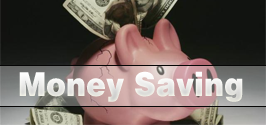I didn’t always see the value in being frugal — despite the fact that I used to be a banker, I was never really taught about money management. I came from a background where my parents made all sorts of sacrifices to see me get ahead in life — even at cost to themselves and their financial stability. And being young, dumb and surrounded by private school kids of a different social caste than myself, I felt a compelling need to keep up with the Joneses at a very young age, something that would take over a decade to finally shake out of my system. It didn’t help that I grew up around hip-hop music in the “jiggy era”, where self-worth was measured by what you owned rather than who you were.
My wife had a very different upbringing from me. She was raised in a traditional Dutch household, where if you weren’t 15 minutes early you were late; you were expected to be at the dinner table before the food was; and even more importantly — you never paid full price.
I’ve learned a lot from my in-laws — they’ve mastered the art of garage saling, knowing the right ones to hit and how early to get there to get the best stuff. They’re master hagglers and know exactly how low they’ll be able to get someone to sell. They know how to time store sales and coupons to get maximum value. They know how to save time, money and effort — how to remove unnecessary complications from life without sacrificing the quality of life.
And that was a wake-up call for me.
We’re often up in arms about the things we can’t do. Things that’re too expensive. Too outside of our means. Too risky. Too much to handle at any given time.
But this simply isn’t true — you just have to plan for it.
It used to be that if I wanted something, I’d simply go and get it. I’ve looked at what I spent money on 5 years ago, 10 years ago — even 15 years ago, and never fail to cringe at what seemed important to me at the time. Now, while I’ve gotten a lot more stuff and the list of things I desire has grown shorter (yet a whole lot more expensive), I’ve learned that patience is a virtue. I’ve learned that I have enough stuff — and enough on my plate to keep me occupied — so that I shouldn’t have to look at new things unless they’re absolutely necessary, and that’s a wonderful realization.
So coming from someone who used to blow all his hard-earned money on anything and everything, here’s some advice I can offer on how to get yourself out of a financial hole if you’re feeling stuck and on the right path to getting where you want to be.
1 — KNOW WHERE YOUR MONEY’S GOING
Johnny Cupcakes said it recently at his talk at NXNE 2013 — one of the biggest problems of broke people is that they don’t know where their money’s going. The sooner you figure that out, the sooner you can take control of where it can go in the future. Even if you’re eating McDonald’s Value Meals every day for lunch, that $5 a day adds up quick.
2 — DON’T BUY WHEN YOU DON’T NEED TO
The rental and try-before-you-buy economies are still alive and well — you just need to be intentional about using them. Libraries have vast collections of physical and digital media; you can stream almost any new album online before you plan to buy it; you can go to trade shows to check out new goods before you plunk the money into them; and most stores have a return policy.
But even more importantly — if it ain’t broke, why fix it? We’ve become far too used to replacing things simply because they’re old, not because they’re actually broken. And even when things are broken, often it’s cheaper to fix things that to buy entirely new ones. We need to make more of an effort to move away from our disposable society and remember to make the most of what we have so we’re not needlessly bleeding money!
3 — NEVER PAY FULL PRICE
Be patient and wait for sales, see if you have friends that can hook you up or want to jump in with you on a bulk purchase, or use those birthdays and holidays to ask for gift cards to go toward the things you really want! It’s completely possible to be current and stylish without completely breaking the bank — you just might need to spend more time instead of money to find the price points that work for you. (Yes, even in Toronto!)
4 — TAKE CARE OF YOUR STUFF
The longer you can make things last, the less often you’ll need to replace them. Wash your clothing carefully, invest in technology that’ll still suit your needs in a few years’ time and don’t buy into fads just to be cool. One of the best investments you can ever make is knowing who you are and what makes you tick — once you’ve solved that puzzle, wasting money on things that fail to resonate with you happens a lot less often.
5 — YOU GET WHAT YOU GIVE
Finally, being cheap doesn’t mean being selfish! Just because you’re trying to save cash, it doesn’t mean you need to be stingy about everything that you get. Yes you can give advice to others for free without expecting anything in return. Yes you can let other people in on the same deals you get without expecting some sort of finder’s fee or commission. If something’s helped you out, hoarding it usually doesn’t make it any more or less potent than if you had let others in on the same knowledge. And if it is about being first, be first. Then pay it forward!
Life isn’t about coming out on top by crushing all of your competition to a pulp. It’s about everyone working to their maximum potential and getting the most out of what the world has to offer — you might think that there’s a finite amount of resources to go around, but I think every problem has a solution. We just need to be creative enough to find the right one.
So yes, it pays to be cheap. You can keep more of your money to do more of what you want, and it doesn’t need to be at the expense of your quality of life. If we can all remember this, we’ll all come out from our days a little wiser… and a little richer.
–case p. guest-posting for CheapDude.com
Casey E. Palmer http://caseypalmer.com
Transforming men from hateable to dateable at http://facebook.com/Mansformation





Hey Case,
Nice post! Great tips.
I love the planning tip. We do a lot of that.
We use an envelope system – we write out the name of the item on the envelope, then we will add money to each of the envelopes in order of priority.
Before we know it, we’re purchasing an awesome item, and doing it with CASH! No loan, no credit and I’m a happy girl.
Just my 2 cents.
Thanks for sharing your experience and knowledge here.
Hi Graham!
C.
The envelope strategy is a great idea Christine!
P.S. Hi ;)
Great tips!!